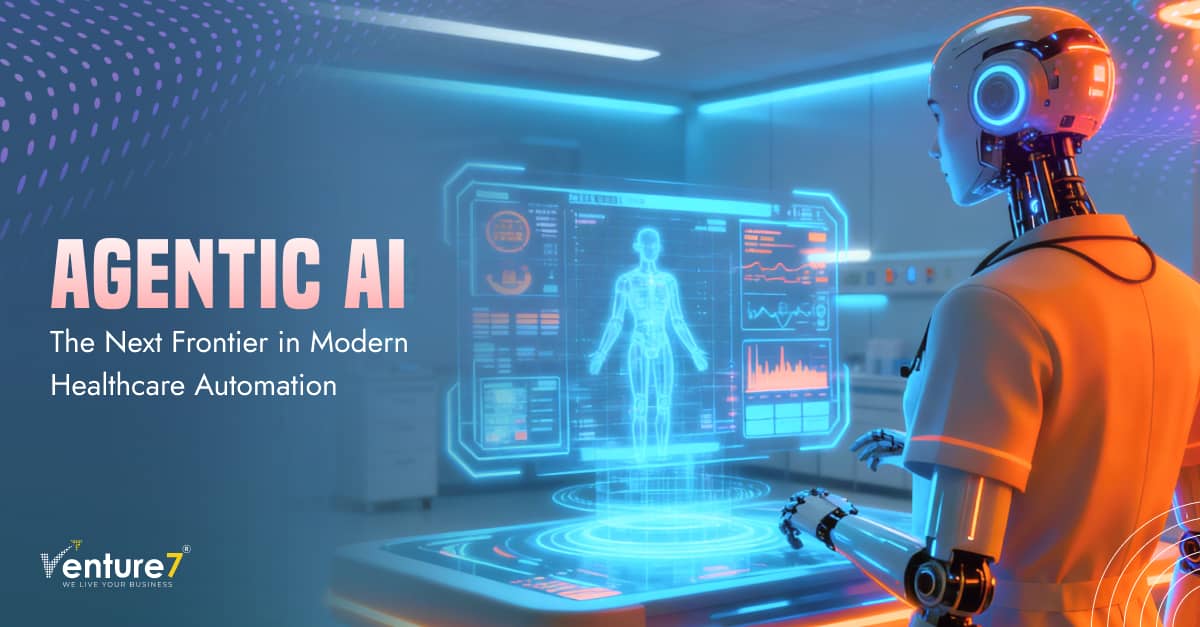Introduction
Agentic AI is reshaping modern healthcare by introducing autonomous AI agents that can reason, plan, and execute complex tasks across clinical, administrative, and patient-care workflows. Unlike traditional AI or rule-based automation, agentic AI adapts to evolving hospital needs, learns from feedback, and autonomously manages high-volume workflows. Hospitals, clinics, and telehealth providers are already witnessing measurable improvements in efficiency, accuracy, and patient satisfaction. In essence, agentic AI acts as a 24/7 digital healthcare workforce, completing multi-step tasks while freeing clinicians to focus on critical patient care.
What Sets Agentic AI Apart in Healthcare
Agentic AI is not just an automation tool – it is a digital healthcare workforce capable of independent reasoning, multi-step workflow execution, and continuous self-improvement. It integrates seamlessly with EHRs, PACS/RIS, billing systems, CRMs, and telehealth tools, performing real-world tasks such as updating records, verifying insurance, submitting claims, and sending patient reminders. Unlike traditional AI, which only predicts or classifies, agentic AI executes full workflows autonomously, reducing errors, improving outcomes, and scaling healthcare operations intelligently.
Why Healthcare Organizations Are Adopting Agentic AI Now
Healthcare systems are under immense pressure due to rising administrative workloads, staff shortages, and increasing complexity in patient care. Agentic AI addresses these challenges by:
- Reducing Administrative Overhead: Automates paperwork, data entry, and scheduling, allowing clinicians to focus on patient care.
- Managing Complex Workflows: Handles multi-step processes across departments efficiently.
- Compensating for Staff Shortages: Acts as a digital co-worker to support overburdened teams.
- Processing Massive Data: Manages lab results, imaging, patient records, and insurance data efficiently.
- Enhancing Patient Experience: Provides 24/7 reminders, follow-ups, and personalized care plans, improving adherence and satisfaction.
These factors drive healthcare organizations to adopt agentic AI for faster, safer, and more efficient operations.
Capabilities of Agentic AI in Healthcare
Agentic AI combines advanced reasoning, goal-driven execution, multi-agent collaboration, tool integration, and continuous learning to handle complex healthcare workflows autonomously.
- Contextual Reasoning – Understands patient context, lab results, medical history, and operational constraints to make informed decisions.
- Goal-Driven Execution – Focuses on outcomes, ensuring tasks like claims processing or appointment scheduling are completed accurately.
- Multi-Agent Collaboration – Different agents, such as triage, documentation, RCM, and patient engagement agents, work seamlessly together.
- Tool Integration – Connects with EHRs, PACS/RIS, billing platforms, CRMs, telehealth tools, and hospital command systems.
- Continuous Learning – Improves performance, accuracy, and efficiency over time through feedback and self-optimization.
These capabilities ensure reliable, scalable, and error-free healthcare operations.
How Agentic AI Transforms Core Healthcare Functions
Clinical Operations:
Automates documentation, lab analysis, discharge summaries, and supports clinical decision-making with coding and summarization suggestions, reducing human error and saving valuable time.
Patient Engagement:
Sends reminders, follow-ups, and personalized care plans. Supports virtual care, telehealth preparation, and symptom guidance, enhancing adherence and satisfaction.
Revenue Cycle & Billing:
Automates insurance verification, claim creation, submission, and denial management, reducing errors and accelerating revenue cycles.
Hospital Administration:
Optimizes bed allocation, OR scheduling, staffing, patient flow, and monitors occupancy and resources in real-time for operational efficiency.
By transforming these functions, agentic AI reduces staff workload, improves accuracy, and enhances patient experience.
Real-World Examples of Agentic AI in Healthcare
- Hospitals & Clinics: Automate patient scheduling, documentation, and billing workflows to free clinical staff for patient care.
- Diagnostics & Radiology: Summarize imaging reports, correlate patient history, and push structured data into EHRs for faster analysis.
- Pharmacy Management: Check drug interactions, schedule refills, route prescriptions, and alert patients on adherence.
- Home Healthcare: Continuous monitoring and proactive intervention using IoMT devices to prevent hospitalization.
- Telehealth Providers: AI agents handle patient intake, history collection, and follow-ups autonomously.
These agents operate 24/7, continuously learn, and reduce dependency on human supervision, improving efficiency, accuracy, and patient satisfaction.
Agentic AI vs Traditional Healthcare Automation
| Feature | Traditional AI | Agentic AI |
|---|---|---|
| Decision-making | Rule-based | Context-aware & goal-driven |
| Adaptability | Low | High |
| Multi-step reasoning | Manual | Autonomous |
| Collaboration | Scripted sequences | Multi-agent orchestration |
| Learning capability | Minimal | Continuous & dynamic |
| Tool integration | API-level only | API + autonomous orchestration |
Impact: Agentic AI moves beyond static workflows to independently optimize operations and improve patient care.
Challenges to Implementing Agentic AI
- Trust & Explainability: Clinicians need visibility into AI decisions for compliance and safety.
- Integration Complexity: Legacy systems may require API bridges or middleware for smooth integration.
- Data Privacy & Compliance: Adherence to HIPAA, GDPR, and HITRUST is critical.
- Clinical Safety: Human-in-the-loop workflows are necessary for high-risk decisions.
- Governance & Monitoring: Multi-agent orchestration requires strong oversight frameworks.
With careful planning, robust infrastructure, and proper change management, these challenges can be addressed effectively.
Technologies Powering Agentic AI in Healthcare
- Large Language Models (LLMs): Understand and reason over clinical and administrative text.
- Reinforcement Learning: Improves decision-making over time through experience.
- Knowledge Graphs: Provide structured understanding of patient and operational data.
- Orchestration Platforms: Manage multi-agent collaboration (e.g., LangChain, AutoGen).
- Cloud Infrastructure: Ensures scalable, real-time responsiveness across departments and workflows.
These technologies enable autonomous, intelligent agents to operate efficiently across complex healthcare ecosystems.
The Future of Agentic AI in Healthcare
- Fully Autonomous Clinical Co-Pilots: Assist clinicians in real-time documentation and decision support.
- Predictive Patient Management Agents: Provide alerts for deterioration, risk scoring, and readmission prevention.
- Multi-Agent Hospital Systems: Coordinate across documentation, billing, triage, and patient engagement.
- AI-Driven Command Centers: Monitor operations, patient flow, and resource allocation in real-time.
- Emotion & Behavior-Aware AI: Analyze patient stress, tone, and behavior to enhance personalized care.
- Autonomous Revenue Cycle Management: End-to-end claim processing with minimal human oversight.
These advancements will redefine healthcare delivery, efficiency, and patient satisfaction.
Conclusion: The Next Frontier Has Arrived
Agentic AI is the backbone of modern healthcare automation. By combining LLMs, autonomous reasoning, and multi-agent orchestration, healthcare organizations can:
- Reduce workload and burnout
- Improve clinical accuracy
- Accelerate operations
- Enhance patient experience
- Drive cost efficiency
Healthcare systems adopting agentic AI today gain scalability, precision, and reliability, staying competitive in an increasingly complex environment.
Ready to Implement Agentic AI in Your Healthcare System?
Venture7® AI Development Services build enterprise-grade, end-to-end Agentic AI solutions for:
- Clinical documentation agents
- RCM automation agents
- Patient-care agents
- Scheduling & operations agents
- Multi-agent orchestration
Transform your healthcare workflows with Agentic AI. Book a free consultation with Venture7® today!





